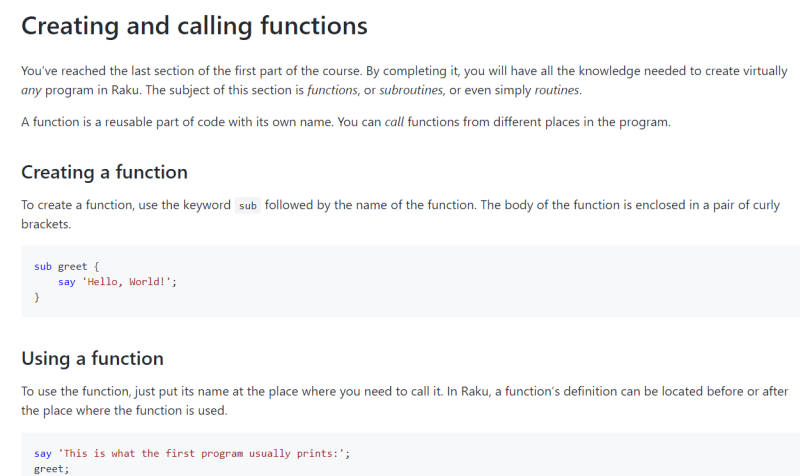| The Course of Raku |
| Written by Nikos Vaggalis |
| Thursday, 18 February 2021 |
|
Thanks to a grant from the Perl Foundation, Andrew Shitov is creating A Complete Course of the Raku programming language, the start of which is now available.
It could had been finished earlier but due to Andrew Shitov, the maker, organizing the PerlCon conference in Rīga, it was postponed for a later date. Fortunately that day has come delivering the first part of the course comprising 91 topics, 73 quizzes and 65 exercises. Judging from that volume, the final cut is going to be massive! If you’re only starting to learn Raku, you are advised to go through all the parts in the order they are listed in the table of contents. If you have some practice and you want to have some specific training, you are welcome to start with the desired section. What's in store for this part, Raku essentials? It opens with a high-level overview and then covers the basics of variables, data types and functions: Basic introduction to Raku and its compiler
Variables and data types essentials
Control flow essentials
More about types
Functions essentials
The other four parts under development are:
Overall, now that Perl 6 has become Raku, it has been set loose to pursue it's own fame and fortune. As such,this course is about of getting to know Raku as well as, later on, diving into its advanced capabilities, all in all covering all the main aspects of the language. The fact that the more advanced topics are not ready yet might be a good thing since you can, without the stress of catching up, just focus on the basics and assimilate them. The course is text-based and I recommend following along with a good book, and for visual learners another video course to get you quickly up to pace. Check the Related Articles at the bottom of this news piece for those. Andrew has also published quite a few Raku books which you can find here. More InformationRelated ArticlesNow Perl 6 Is Raku, Perl 5 Can Be 7 Perl and Raku Both Anticipating Newfound Glory
To be informed about new articles on I Programmer, sign up for our weekly newsletter, subscribe to the RSS feed and follow us on Twitter, Facebook or Linkedin.
Comments
or email your comment to: comments@i-programmer.info |




